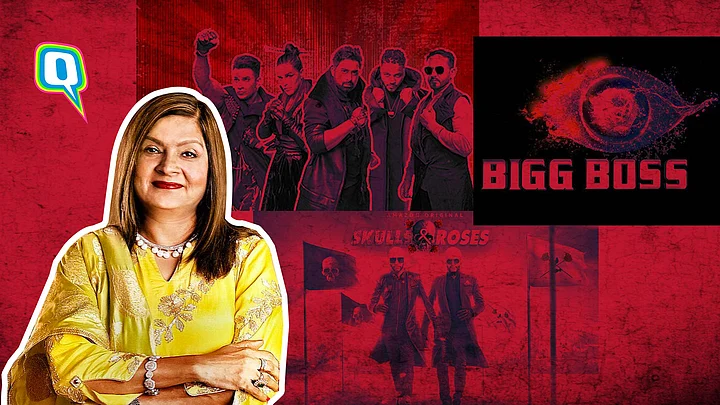Netflix's latest offering, Indian Matchmaking, has left its viewers divided - there's one half that's straight-up appalled at how it glorifies regressive Indian practices and the other half that's thoroughly enjoying how awful the show is. And I have to admit that I fall in the latter half. I not only binged it but also recommended it to my mother, hoping that she too would find it as ridiculous as I did (the jury's still out on that).
My earliest memory of what we today call as "guilty pleasure" or "hate-watching" is Crime Patrol. Not exactly a reality show, but an anthology series based on gruesome real-life crime stories, Crime Patrol was my parents' guilty pleasure for the longest time. At one point, they'd fall asleep to Crime Patrol, wake up and talk about how it's not an ideal bedtime watch, and then find themselves in front of the TV again after dinner. It wasn't until the likes of MTV Roadies, Fear Factor: Khatron Ke Khiladi and Bigg Boss entered my life that I truly understood what was happening.
I *try* to maintain my distance from reality TV but that doesn't make me immune to the voyeuristic pleasures of the genre. Reality shows are (mostly) mindless fun for multiple reasons.
For starters, there's absolutely no stress of keeping up with a linear storyline. I could easily miss an episode without too much FOMO. When it comes to reality shows like Indian Idol, Sa Re Ga Ma Pa or KBC, there's an incredibly addictive feel-good element that keeps us going. Whereas Bigg Boss and MTV Roadies allow us to watch people be their most embarrassing, awful selves - but it's a double-edged sword. On one hand, there's a relatability factor, and on the other there's the irresistible pleasure of schadenfreude. You're allowed to laugh at them because everyone else is also laughing at them.
'Hate-watching' 'cringe' and 'trashy' content in an ironic way has evolved into a widely accepted cultural phenomenon. Reality shows, at this point in time, constitute a fossilized yet evolving genre of content. Keeping that in mind, how important is it to call out its problematic roots?
Over the last few days, many have taken to social media to describe Indian Matchmaking as triggering. Accusing it of glorifying and upholding oppressive systems of caste, class and gender inequality.
Some have even blamed those who 'hate-watched' the show for being complicit in their own way. All of these are very valid points. Most of Sima mami's clients are a reflection of modern India's regressive roots and even if the blame isn't entirely on Sima Taparia, she's still an enabler.
Personally, when I cringe-watched Indian Matchmaking, my enjoyment was slightly subversive. My privilege and sense of security allowed me to ridicule it, without explicitly addressing its serious implications. Indian Matchmaking might seem to lack an insider's nuanced gaze, but for me, it captured all the flawed bits of our society that we refuse to accept. And I laughed, as a coping mechanism.
But there's a difference between me laughing at the toxicity of the unfortunate reality of our country while sitting in my living room and me laughing at the same thing when it's on Netflix. The latter gives it undue legitimacy.
So while the criticism is fair, does it mean anything considering we already have an unfazed history of problematic reality shows?
Bigg Boss, perhaps one of India's biggest reality television shows, hosted by Salman Khan, is another fitting example, in some aspects. For example, when someone like Hindustani Bhau - a very problematic social media influencer - features on a show like Bigg Boss, it makes his presence and reach more mainstream.
Even MTV Roadies, currently on its 18th season, has a history of capitalising on a culture of ruthless harassment and bullying. Shows like Rakhi Ka Swayamwar and MTV Splitsvilla, though immensely popular, also came with a fair dose of cringe and sexism.
Raghu and Rajiv, the Roadies guys, recreated the Roadies culture in a Splitsvilla setting with Skulls & Roses, another reality show streaming on Amazon Prime Video.
There's some talk about how this 'hate-watching' culture has exploded at a time when we're deprived of human interaction. But in all honestly, we've been enjoying trash content for a while now.
Why else would a show like Dilli Darlings, the cringiest desi offspring of Keeping Up with the Kardiashians and The Real Housewives, have an audience at all?
Hate-watching trashy reality shows is a complicated, inexplicable idea - just because someone is watching it in its entirety, doesn't mean they necessarily believe in the problematic values portrayed by a reality show. But like a Twitter user rightfully pointed out, it does boil down to a numbers game, doesn't it? If we're watching it (ironically or not), there's going to be more of it.
